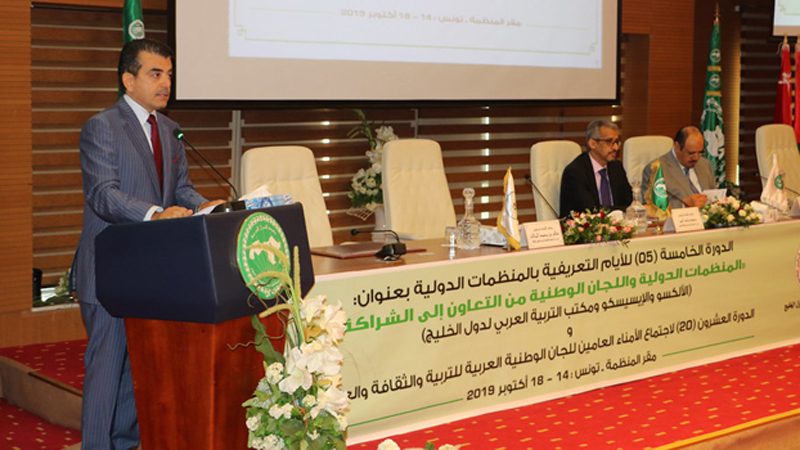
ISESCO Director General calls on National Commissions to be more interactive with the Organization

17 October 2019
The Director General of the Islamic Educational, Scientific and Cultural Organization (ISESCO), Dr. Salim M. AlMalik, stated that the present juncture in the history of the Islamic world gives rise to greater responsibilities to tackle challenges and require constant attention to adapt to and keep abreast of changes, as part of a new innovative and comprehensive vision, and through scientific approaches and an anticipatory culture.
In his address at the opening of the 20th Meeting of the Secretaries General of Arab states’ National Commissions for Education, Science and Culture, held today in Tunis, Republic of Tunisia, ISESCO Director General underlined that “the tough challenges faced by the Islamic world should not shatter our hopes and discourage us from working. A glimmer of hope is always in the horizon as long as there are good initiatives, firm resolve and good anticipation of the future, as Ibn al-Muqaffa says: whoever travels aimlessly, his mount will let him down”.
In addition, Dr. AlMalik stated that advancing the civilizational project in the Arab-Islamic world hinges on updating educational systems; promoting science, technology, innovation and creativity; and renewing policies specific to culture, communication and information. He added that that this civilizational project embodies the collective objective of joint Arab-Islamic action in the fields closely connected to the elaboration of development policies and knowledge systems.
In the same vein, ISESCO Director General pointed out that ISESCO’s new development vision, whose broad-lines are contained in the Medium-Term Strategic Plan (2020-2029), adopts the slogan “Building Systems… Making Minds” and that it will be implemented as part of a forward-looking approach that aims to accomplish ISESCO’s mission and desired objectives. He highlighted that the vision consists of making of ISESCO a beacon of global outreach in the fields of civilizational edification, knowledge progress, with the mission of elaborating development policies and building knowledge and innovation systems, and providing expertise, technical counsel and institutional support.
Moreover, Dr. AlMalik urged Member States to be more effective, be makers of decisions instead of passive observers and achieve their autonomy as dependency, he maintained, kills ambitions and aspirations and breaks wills. He also reaffirmed that from now on, ISESCO will never propose programmes and workshops but rather will wait for the propositions of National Commissions, while taking into consideration their outcomes and impact assessment. He explained that each Commission lives the reality of its country and is well aware of its needs and requirements, while promising that ISESCO would be at the level of expectations of National Commissions only when it receives their support and the one of their countries.





